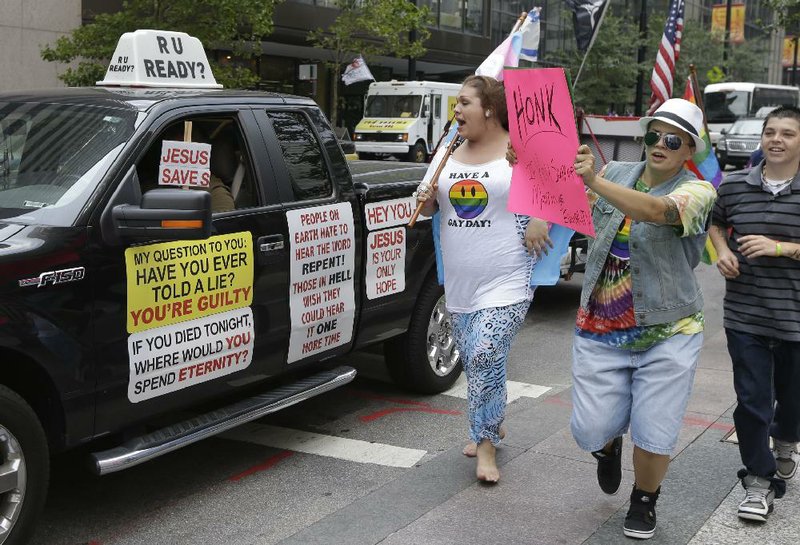CINCINNATI -- A federal appeals court judge hearing arguments in six gay-marriage fights in a landmark hearing Wednesday expressed skepticism about whether the courts are the ideal setting for such major change, saying that the democratic process is the best way to win the hearts and minds of Americans.
RELATED ARTICLE
http://www.arkansas…">Gay-marriage filings suggest Utah case keyhttp://www.arkansas…">Comeback near for anti-gay law, 150 legislators in Uganda promise
The judge, Jeffrey Sutton of the 6th U.S. Circuit Court of Appeals, peppered attorneys with the question and said it was strange that the same-sex couples fighting statewide bans weren't showing more patience.
"I would have thought the best way to get respect and dignity is through the democratic process," Sutton said. "Nothing happens as quickly as we'd like it. ... I'm not 100 percent sure it's the better route for the gay-rights community."
Sutton and two other judges from the 6th Circuit heard arguments in six cases from Ohio, Kentucky, Michigan and Tennessee in the biggest such session on the matter so far.
If the 6th Circuit rules against gay marriage, that would create a divide among federal appeals courts and put pressure on the U.S. Supreme Court to settle the issue in its 2015 session. The appeals panel did not indicate when it would rule.
Another judge on the panel criticized Sutton's argument Wednesday, saying that sometimes courts need to intervene when constitutional rights are being violated.
Judge Martha Craig Daughtrey, a nominee of former President Bill Clinton, pointed out that it took decades for women to win the right to vote.
"Do you have any knowledge of how many years I'm talking about, going into every state, every city, every state board of elections, for 70 years?" Daughtrey said of women's efforts for voting rights. "It didn't work. It took an amendment to the Constitution."
Deborah Cook, a George W. Bush nominee, is the third judge on the panel.
Sutton, also a Bush nominee, is known for being unpredictable, shocking Republicans in 2011 when he became the deciding vote in a 6th Circuit ruling that upheld President Barack Obama's health care law.
The afternoon of arguments opened with Michigan's solicitor general, Aaron Lindstrom, saying that any change in the state's ban on same-sex marriage should come through the political process.
"The most basic right we have as a people is to decide public policy questions on our own," he said.
Fundamental constitutional rights shouldn't be decided in popular votes, countered attorney Carole Stanyar, who represents the plaintiffs in that case.
"The Michigan marriage amendment gutted the democratic process," she said.
In Ohio's cases, civil-rights attorney Al Gerhardstein of Cincinnati said the state's refusal to recognize out-of-state gay marriages violates the dignity of same-sex couples and amounts to unique discrimination, because Ohio has historically recognized marriages in other states that wouldn't be legal in Ohio, such as between cousins or involving minors.
Eric Murphy, Ohio's state solicitor, said Ohio has traditionally defined marriage as between a man and a woman and that same-sex marriage is too new to be considered a deeply rooted, fundamental right.
Outside the courthouse in nearby Fountain Square, advocates held up banners and signs urging freedom to marry. Jon Bradford, 26, of Covington, Ky., wore a wedding dress, and his partner, Matt Morris, wore a top hat and formal shirt.
"It's to make a statement, really," Bradford said. "We want to be married."
He said they were hopeful the court will rule in favor of same-sex marriage.
"One day, it's going to happen," he said. "You can't stop love."
About a dozen gay-marriage opponents prayed the rosary outside the courthouse.
"I'm just praying for God's will to be done," said Jeff Parker, 53, from the Cincinnati suburb of Madeira.
The 6th Circuit is the first of three federal appeals courts to hear gay-marriage arguments in coming weeks. The 7th Circuit in Chicago has similar arguments set for Aug. 26 for bans in Wisconsin and Indiana. The 9th Circuit in San Francisco is to take up Idaho's and Nevada's bans Sept. 8.
Two federal appeals courts have ruled in favor of gay marriage. On Tuesday, Utah appealed one of those rulings, asking the U.S. Supreme Court to take up the case and uphold its ban. Oklahoma followed suit Wednesday.
The Oklahoma appeal was filed by an organization representing Tulsa County Clerk Sally Howe Smith, who was sued after refusing to grant a marriage license to a same-sex couple several years ago.
The 10th U.S. Circuit Court of Appeals sided with the couple last month, upholding a federal judge's ruling that found the ban unconstitutional. However, those rulings are on hold as the case moves through the courts, meaning same-sex couples haven't been allowed to marry in Oklahoma.
Gay marriage is legal in 19 states and the District of Columbia.
Information for this article was contributed by Lisa Cornwell, Dan Sewell and staff members of The Associated Press.
A Section on 08/07/2014


